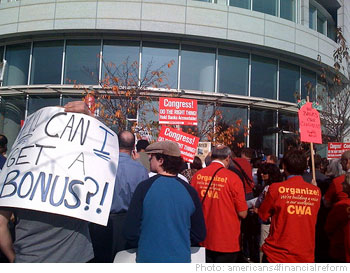 A senior aide to a Congressman emailed me regarding the debate on Capitol Hill. I responded:
A senior aide to a Congressman emailed me regarding the debate on Capitol Hill. I responded:
Nell Minow knows what she is talking about, but this paragraph on page 5 is the money shot:
But the key is the board. It is unfathomable to me that many of the very same directors who approved the outrageous pay packages that led to the financial crisis continue to serve on boards. We speak of this company or that company paying the executives but it is really the boards and especially their compensation committees and until we change the way they are selected, informed, paid, and replaced we will continue to have the same result. Until we remove the impediments to shareholder oversight of the board, we cannot hope for an efficient, market-based system of executive compensation.
Pay can’t be reformed unless corporate governance is reformed. Her suggestions above that are “mom-and-apple pie,” but they never get implented because boards are captured by their executives. What she says on board reform after the aforementioned paragraph is crucial.
Away from that, anyone structuring incentives quickly learns:
1. Short-term incentives motivate more.
2. Incentives based on what the employee can control motivate more than those he can’t.
3. Cash now is preferred to anything else — it motivates more, unless there is tax deferral as a goal, or, inflation of apparent corporate profits, because the issuance of stock does not hit the income statement as a cost.
4. Some incentives are near-guaranteed because there are goals of not destroying the firm through taking too much risk — those should disappear during a crisis. In this case, they didn’t but they should have disappeared.
That’s why Wall Street’s incentives were designed the way they were — they motivate to a high degree; that is the culture of Wall Street. They should have cancelled bonuses because of the crisis — they would have if they had not been bailed out, which the Government stupidly did, and even then did it stupidly.
If the government had merely backstopped the derivatives counterparties, while sending losses to the holding companies until they were insolvent, and running an RTC 2, rather than just handing cash to holding companies, this all could have been avoided. The systemic risk would have passed — most firms on Wall Street would be in insolvency, and bonuses would not have been paid.
The fault belongs mainly to the Fed and Treasury; they botched their jobs.
Back to incentives — the four points above work best for companies when revenues and expenses of the business are short term in nature. But when the results of business take a while to develop, like selling a life insurance policy, the accounting gets complex. So do the incentives. Life insurance companies typically pay agents most of their compensation in a lump at the sale. There are limited clawbacks. Other methods of compensating agents more gradually have been tried, and generally, they don’t work so well with making sales.
But management aren’t salesmen — they should be bright and motivated on their own, or they shouldn’t have their jobs at all. They shouldn’t need the “immediate gratification” incentives, and should be able to live with the eight reforms that Nell Minow suggests. This is particularly true for financial companies, the the true results of activity will not be known for years. Creating longer-term incentive structures will aid stability and improve management of the firms. The firms will be less aggressive, and that is good. Aggressive financials almost always blow up.
To close, if you want to see this happen, corporate governance should be changed, where boards cannot so easily be captured by their managements. Otherwise, this issue will return.
Disclaimer: This page contains affiliate links. If you choose to make a purchase after clicking a link, we may receive a commission at no additional cost to you. Thank you for your support!


Thanks for the kind words!